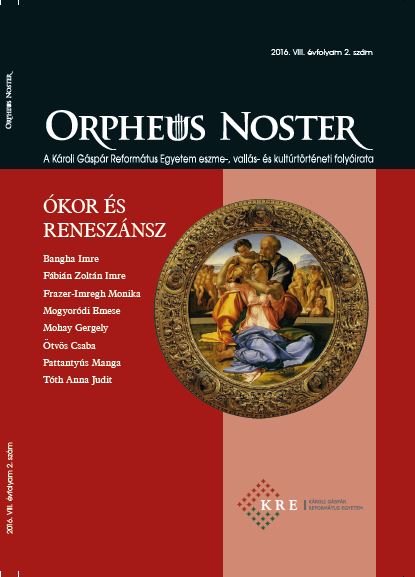Xenophanész és „a filozófusok istene”
Xenophanes and ‘the God of the Philosophers’
Author(s): Emese MogyoródiSubject(s): Philosophy, Theology and Religion, Ancient Philosphy, History of Religion
Published by: Károli Gáspár Református Egyetem
Keywords: Greek philosophy; Xenophanes; Greek theology philosophy
Summary/Abstract: The article addresses the issue of the rise of theological speculation proper within Greek philosophy. Delineating the criteria that distinguish earlier theistic cosmologies from theology, it argues that genuine theological concerns might be attributed to Xenophanes as its earliest Greek representative. Xenophanes᾽ speculations on divinity must be distinguished from those of his Ionian predecessors not only on the grounds that he puts reasoning (of an a priori kind) directly in the service of a coherent reflection on the nature of god rather than on that of ‘the divine’ (the first criterion for θεολογία, characteristic of ‘natural theology’), but also because of his (ethico-religious) practical concerns. His God is not posited to serve as an ultimate metaphysical or physical principle or cause (‘the god of the philosophers’), but is characterized as a truly eternal, omnipotent and omniscient supreme person, worthy of a more profound religious reverence than the gods of Homer and Hesiod. Hence, θεολογία in Xenophanes is not merely ‘rational thought’ about the divinity, but also ‘reverent speech’ befitting the sublimity of the supreme Godhead (the second criterion for θεολογία, functionally equivalent to ‘supernatural theology’). Through speaking of God and calling for worshipping Him by ‘reverent myths (μῦθοι) and pure words (λόγοι)’ (B1.14), Xenophanes not only created theologia, but performed it, hence ( factually) turning it into cultic practice (the third characteristics of Xenophanean θεολογία, in the purview of ‘political’ or ‘civic theology’). Thus, the earliest Greek theology proper is opposed only to ‘mythical theology’, but its ‘natural’, ‘supernatural’ and ‘political’ aspects are deeply intertwined. It is further concluded that at the birth of Greek theology philosophy served neither as a handmaid, nor as an opponent, but as a midwife.
Journal: Orpheus Noster. A KRE Eszme-, Kultúr-, és Vallástörténeti Folyóirata
- Issue Year: VIII/2016
- Issue No: 2
- Page Range: 59-73
- Page Count: 15
- Language: Hungarian

